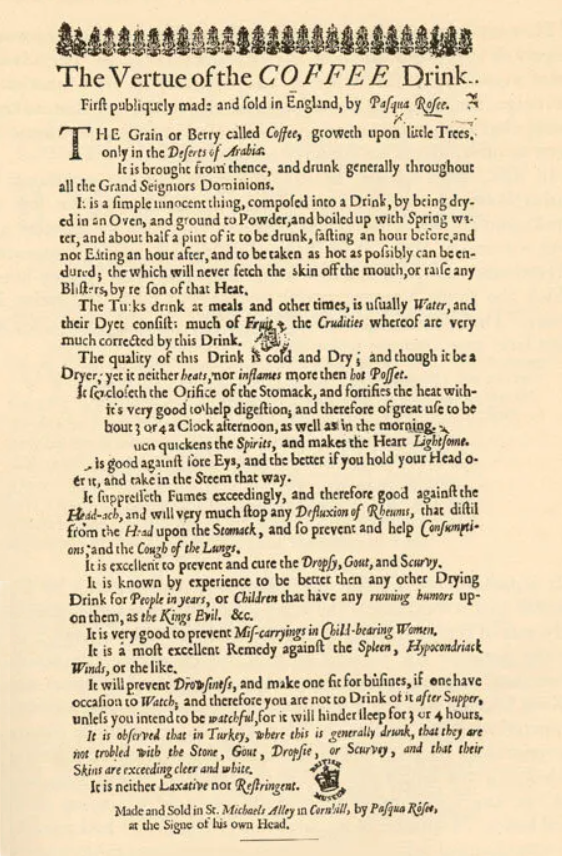The first ad of coffee

The story of coffee goes back to the 13th century, when it came out of Ethiopia, then spread to Egypt and Yemen. It reached the Middle East, Turkey, and Persia during the 16th century, and then Europe during the early 17th, though not without controversy. In Venice, some called it the ‘bitter invention of Satan,’ but the Pope, upon tasting it, gave it his blessing. By 1652, St. Michael’s Alley, the first cafe in London opened its doors, bringing coffee to England, thanks to a Sicilian immigrant, Pasqua Rosée.
Today, the British Museum houses a handbill that may well be the first advertisement for coffee in England. It proves remarkable for a couple of reasons. First, the ad introduced Brits to what’s now a staple of the Western diet, and eventually they’d bring it to North America. And, what’s more, you can see another instance of the adage that the more things change, the more they stay the same. Advertising is advertising, and then, as now, beverages were sold on their taste and health properties. And, of course, you were encouraged to consume the product not once, but twice a day. Y
Text:
THE Grain or Berry called Coffee, groweth upon little Trees, only in the Deserts of Arabia.
It is brought from thence, and drunk generally throughout all the Grand Seigniors Dominions.
It is a simple innocent thing, composed into a drink, by being dryed in an Oven, and ground to Powder, and boiled up with Spring water, and about half a pint of it to be drunk, fasting an hour before and not Eating an hour after, and to be taken as hot as possibly can be endured; the which will never fetch the skin off the mouth, or raise any Blisters, by reason of that Heat.
The Turks drink at meals and other times, is usually Water, and their Dyet consists much of Fruit, the Crudities whereof are very much corrected by this Drink.
The quality of this Drink is cold and Dry; and though it be a Dryer, yet it neither heats, nor inflames more than hot Posset.
It forcloseth the Orifice of the Stomack, and fortifies the heat with- [missing text] its very good to help digestion, and therefore of great use to be [missing text] bout 3 or 4 a Clock afternoon, as well as in the morning.
[missing text] quickens the Spirits, and makes the Heart Lightsome.
[missing text]is good against sore Eys, and the better if you hold your Head o’er it, and take in the Steem that way.
It supresseth Fumes exceedingly, and therefore good against the Head-ach, and will very much stop any Defluxion of Rheumas, that distil from the Head upon the Stomach, and so prevent and help Consumptionsand the Cough of the Lungs.
It is excellent to prevent and cure the Dropsy, Gout, and Scurvy.
It is known by experience to be better then any other Drying Drink for People in years, or Children that have any running humors upon them, as the Kings Evil. &c.
It is very good to prevent Mis-carryings in Child-bearing Women.
It is a most excellent Remedy against the Spleen, Hypocondriack Winds, or the like.
It will prevent Drowsiness, and make one fit for Busines, if one have occasion to Watch, and therefore you are not to drink of it after Supper, unless you intend to be watchful, for it will hinder sleep for 3 or 4 hours.
It is observed that in Turkey, where this is generally drunk, that they are not troubled with the Stone, Gout, Dropsie, or Scurvy, and that their Skins are exceeding cleer and white.
It is neither Laxative nor Restringent.
Made and Sold in St. Michaels Alley in Cornhill, by Pasqua Rosee, at the Signe of his own Head.

From: openculture.com huffpost.com




